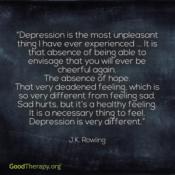 More than 200 common medications list depression as a possible side effect. Some are psychotropic drugs such as anti-anxiety pills. Other drugs are for physical ailments such as high blood pressure, heartburn, or pain.
More than 200 common medications list depression as a possible side effect. Some are psychotropic drugs such as anti-anxiety pills. Other drugs are for physical ailments such as high blood pressure, heartburn, or pain.
New research in the Journal of the American Medical Association examines the prevalence of depression-related drugs. The study found that more than one in three Americans now uses a medication that increases their risk of depression.
Widespread Use of Depression-Linked Medications
The research used a cross-sectional population-based survey of 26,192 adults. Researchers surveyed adults every two years between 2005 and 2014. They asked participants which prescription drugs they had taken in the last month. They also assessed adults for depression.
Participants were an average of 46.2 years old. An estimated 7.6% reported depression. Overall, 37.2% of recruits reported using a drug with depression as a potential side effect.
The rate of polypharmacy rose noticeably over the study. The study defined polypharmacy as taking three or more drugs linked to depression at once. From 2005-2006, the rate of polypharmacy was 6.9%. By the end of the study (2013-2014), this rate had increased to 9.5%.
Depression rates were higher among people who used drugs linked to depression.
- Among people who did not use such medications, the overall depression rate was 4.7%.
- People who used one drug linked to depression had a rate of around 7%.
- Adults who used three or more of these medications had a depression rate of 15%.
This pattern does not necessarily mean these drugs cause depression. Other factors might account for the difference. For example, a person’s depression may stem from an illness that requires multiple medications.
When Medication Increases One’s Risk for Depression
The study authors urge people to discuss potential medication side effects with their doctors. In some cases, people may be able to stop taking medication with the right lifestyle changes. Switching to another medication may also be an option.
Therapy can support people experiencing depression, including depression due to medication or chronic illness. Therapists can also help individuals advocate for themselves in medical settings.
References:
- Aubrey, A. (2018, June 12). 1 in 3 adults in the U.S. takes medications linked to depression. NPR. Retrieved from https://www.npr.org/sections/health-shots/2018/06/12/619274492/1-in-3-adults-in-the-u-s-take-medications-that-can-cause-depression
- Johnson, C. Y. (2018, June 12). More than a third of American adults take prescription drugs linked to depression, study says. Washington Post. Retrieved from https://www.washingtonpost.com/news/wonk/wp/2018/06/12/more-than-a-third-of-american-adults-take-prescription-drugs-that-may-increase-risk-of-depression-study-says/?utm_term=.92ae4cdd03fa
- Qato, D. M., Ozenberger, K., & Olfson, M. (2018). Prevalence of prescription medications with depression as a potential adverse effect among adults in the United States. JAMA: The Journal of the American Medical Association, 319(22). Retrieved from https://jamanetwork.com/journals/jama/article-abstract/2684607
© Copyright 2018 GoodTherapy.org. All rights reserved.
The preceding article was solely written by the author named above. Any views and opinions expressed are not necessarily shared by GoodTherapy.org. Questions or concerns about the preceding article can be directed to the author or posted as a comment below.

 What Is Atypical Depression? Diagnostic and Treatment Considerations
What Is Atypical Depression? Diagnostic and Treatment Considerations 8 Quotes to Help Explain How Depression Feels
8 Quotes to Help Explain How Depression Feels How Can Befriending Our 'Head Noise' Diminish Anxiety and Depression?
How Can Befriending Our 'Head Noise' Diminish Anxiety and Depression?